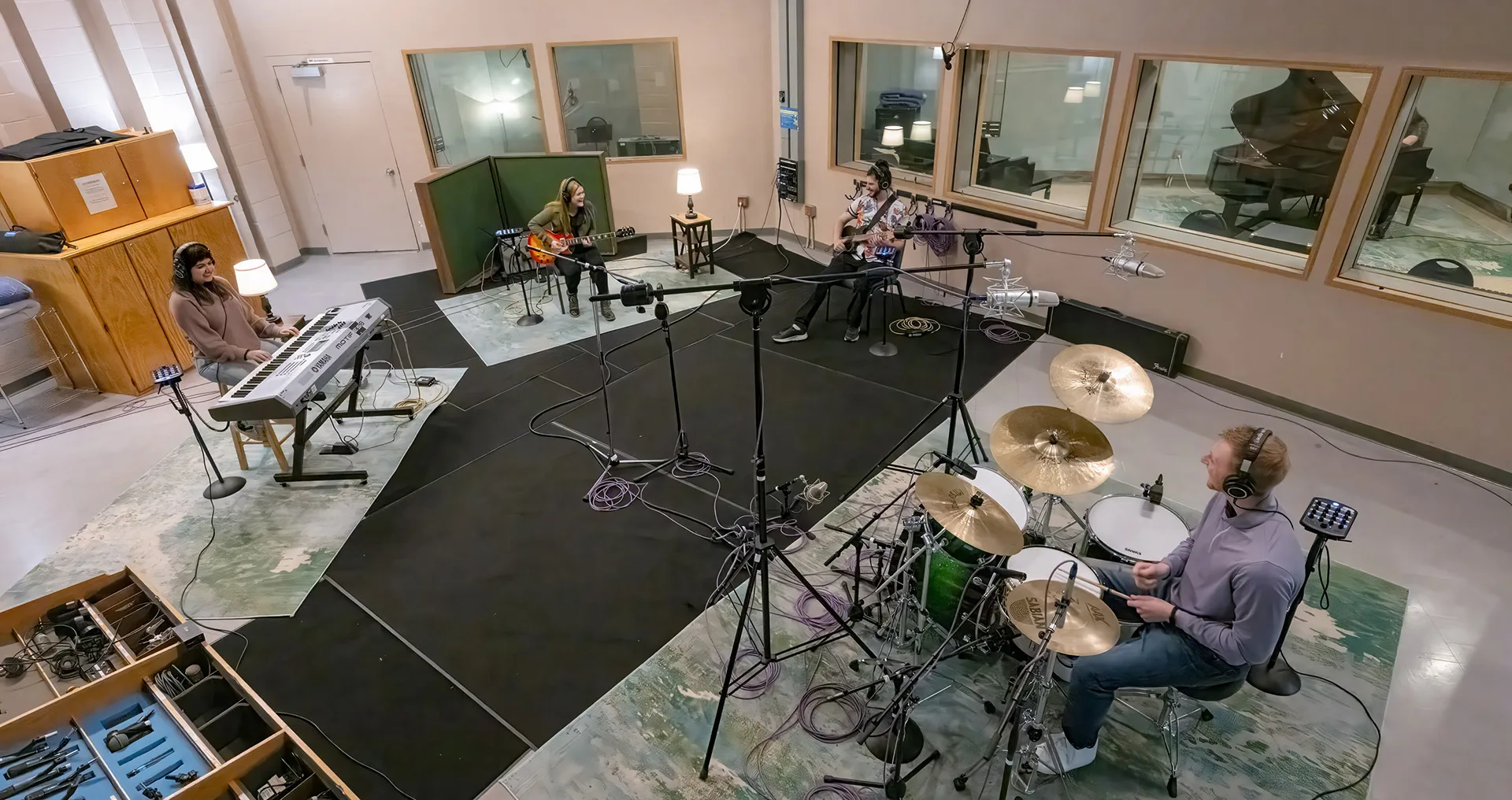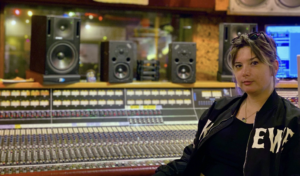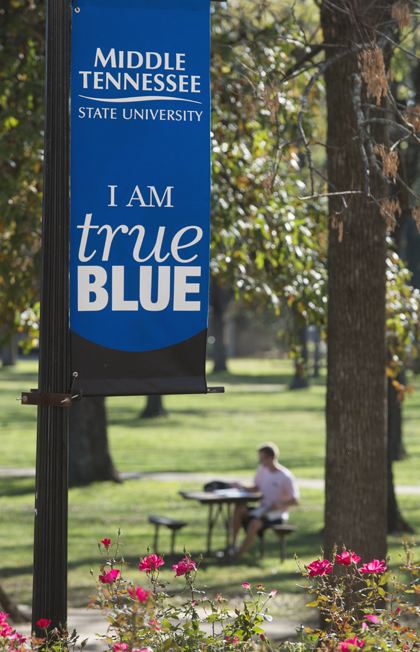
Recording Arts and Technologies
Master of Fine Arts
Recording Arts and Technologies, M.F.A.
The Master of Fine Arts in Recording Arts and Technologies in the College of Media and Entertainment at MTSU offers preparation for advanced work in audio production, recording, and integrated electronic media. Coursework helps students develop a strong foundation in audio production and an understanding of the theoretical concepts of closely related disciplines. The program is designed to foster creativity and features a strong technical component utilizing the latest advancements in software and hardware.
A diverse range of technical and artistic projects are produced, culminating in a final project of professional caliber. The degree plan also offers preparation for select graduates to teach at the postsecondary level in the field of audio recording and production. Creativity is one of the primary qualities sought in new students for the six-semester program. This creative background may be in audio engineering or in a field closely related to what might be described as "entertainment technology."
If you live in one of these states: AL AR FL GA KY LA MD MS OK SC VA; you may be able to attend MTSU at in-state rates under the Academic Common Market program.
Related Media

Alum Highlight

Sarah Bailey stars, sings, acts, records, composes music, and is the creative visionary behind the streaming series "Incognita's Infamous Adventures". It all started with a song she wrote called "Gutsy Girl In Tights" about a flawed, quirky girl who also happens to be a superhero.
The song grew into a full-fledged film that Sarah created for her M.F.A. final project. Sarah met Media Arts professor Allie Sultan who believed in the vision and agreed to produce it. After months and months of filming and post production, the world of "Incognita's Infamous Adventures" has been winning awards at film festivals, getting rave reviews, and going viral on TikTok. The series is a fun and playful superhero sci-fi musical comedy that uses font names instead of swear words and the superheroes' fondest wish is to have dental insurance. Her nemesis, Badio is also her love interest and real-life husband Christoper Bailey.
Awards won:
2021 Winner Best Web Series — Orlando Film Festival
2021 Nominee Best VFX — Orlando Film Festival
2022 Nominee Best Fantasy/Scifi — Stareable Fest LA
2022 Tennessee Spirit Award — Tennessee International Independent Film Festival
Incognita is now streaming on Prime Video and The Fantasy Network. The soundtrack is available on Spotify and Apple Music along with all other major digital platforms. Season 2 is currently in the fundraising and preproduction stages.
Alum Highlight

Emily Eck is the full-time engineer and studio manager for indie rock band Arcade Fire. She spent the last three years recording their newly released album "We", which has just been nominated for Best Alternative Music Album in the 2023 GRAMMYs!
Congratulations Emily!
During the process of making the album, Emily traveled around North America and Europe working with producers and artists including Radiohead's Nigel Gorich, Peter Gabriel, Father John Misty, Beck, Joy Divison's Stephen Morris, Geoff Barrow, Pulp's Steve Mackey, and more.
After graduating from our MFA program in 2014, Emily returned to her hometown of New Orleans, Louisiana to record and mix records. Her credits reflect the influence that the culturally diverse city has had on her life, which encompass genres such as Cajun, Mardi Gras Indian, Hatian, Brass Band, Electronic, and Indie Rock. Along her career, she has shared the control room with some of her own childhood heroes such as Dr. John, Irma Thomas, and The Neville Brothers. Emily received a GRAMMY acknowledgment in 2018 for her work on Lost Bayou Ramblers "Kalenda" for Best Regional Roots Music Album. She also taught a college course in recording studio techniques at Loyola University, which had previously been taught by the first woman to win a GRAMMY for Best Engineered Album, Trina Shoemaker.
Emily attributes her ability to step right into the occasion, or sit in the studio's hot seat and survive, to the fundamental time she spent at MTSU building her engineering chops.
Careers Information
This M.F.A. helps foster and develop creativity and trains students in technology for advanced work in audio/music engineering or related fields that could be described as “entertainment technology.” Graduates can use the degree program to excel in professional pursuits such as
- Audio post-production engineer
- Audio studio design and installation
- Broadcast audio
- Independent audio contractor
- Live sound engineer
- Manufacturer audio product specialist
- Mastering engineer
- Media specialist
- Recording studio engineer
- Recording studio manager
- Retail audio sales
- Sound design for film/video
- University professor
Employers of MTSU alumni include
- Alabama State University
- Asbury University
- Avid
- Belmont University
- Brickhouse Records
- Butler University
- Clair Brothers
- CNN
- GC Pro
- Hope College
- Jeff Slaughter Ministries
- Middle Tennessee State University
- National Public Radio (NPR)
- New England School of Communications
- Old Dominion University
- Rensselaer Polytech
- Sweetwater
- Tennessee Digital Video
- Top Track Recording
- Truphonic Recording Studios
- Yamaha Corporation of America



The Department of Recording Industry offers a Master of Fine Arts (M.F.A.) in Recording Arts and Technologies.
A limited number of students, typically 12-14, are accepted each year for fall admission. The quality of the creative portfolio is usually the determining factor in admission.
A previous degree in audio engineering/music technology isn’t required, but some students with little or no audio background may be asked to complete foundation audio courses in the summer before starting the program.
Residents from the following states are eligible to enroll in this program at MTSU at the in-state tuition rate through Academic Common Market agreements: Alabama, Arkansas, Florida, Georgia, Kentucky, Louisiana, Maryland, South Carolina, Virginia, and West Virginia.
The M.F.A. program normally has two or three graduate assistantships to award each fall.
For complete curriculum details, click on the REQUIREMENTS tab above.
Application Procedures
All application materials must be sent to the College of Graduate Studies with the exception of the creative portfolio. The portfolio is sent directly to the M.F.A.Director in the Department of Recording Industry.
To apply, please submit the following to the College of Graduate Studies:
- Application with the appropriate application fee;
- Official scores on the GRE;
- Official transcripts of all previous college work;
- A formal statement of purpose addressing the applicant’s career goals, related workexperience, and how this degree will help attain the stated career goals;
- Two letters of recommendation for graduate study-one from the undergraduate major advisor if the student is a recent graduate;
Creative portfolio – submitted directly to the M.F.A. Director.
The portfolio is an important piece to your admissions application and should represent your best creative achievements in the areas of audio recording, music composition, video, film, or multimedia. The portfolio may contain a broad range of materials as applicants to the program come from a wide range of backgrounds and have developed a diverse range of creative skills. Typically, the admissions portfolio contains digital audio and/or digital video recordings. These may come from sources such as prior undergraduate coursework, recitals, home recordings, professional work, or other events. While audio quality is always important, the quality of the recording is not necessarily the admissions committee’s primary concern. The committee is looking for your creative potential.This might be expressed through the musicianship, arrangement, composition, or creative message of the work. We do not expect our new students to be professional audio engineers, but we are looking for bright creative media creators. ! It is also very important to document your contribution to each item you submit. For example, if you submit an audio recording, state if you were composer, performer, engineer, producer, or several of these things. The portfolio should contain:
- A comprehensive credit list for all of the entires;
- A short paragraph for each entry explaining the piece, where and when it was created and any challenges faced in the creation of the work;
- Four to six audio examples;
- Video examples (optional);
- You may also wish to include a personal introduction on video as well (optional)
Format
You may choose to submit your portfolio in one of two ways (upload or website). However, all portfolio elements must come together as a single presentation. In other words, do not submit a portion of the portfolio in one format and the rest in another. Below are descriptions of the options.
The portfolio is sent directly to the M.F.A. Director in the Department of RecordingIndustry. All other application materials (GRE scores, letters of recommendation, letter of intent, and transcripts) must be sent to the College of Graduate Studies.
- Option 1 – File Transfer
- Upload all of your portfolio materials together using www.wetransfer.com. It is important when using this option that all elements (documentation, audio, and video) are contained within one computer ”folder” and uploaded as a single file. Do not make multiple uploads (i.e. one for each recording). For example: Create a folder on your computer and name it “Lastname_Portfolio”. Place the following in the folder:
- Word file or pdf of credits and documentation
- 01_Song1
- 02_Song2
- 03_Video1 etc.
- Use “zipit” to compress the data size of the folder.
- We recommend using http://www.wetransfer.com. This service is free for up to two gigabytes of data and is very easy to use. To use the free version no account registration is required!
- Go to www.wetransfer.com
- Skip to the free service
- Click “Add files” and select your portfolio folder or zip file
- Enter [email protected] as the recipient email
- Enter your email and click “transfer” !
- Upload all of your portfolio materials together using www.wetransfer.com. It is important when using this option that all elements (documentation, audio, and video) are contained within one computer ”folder” and uploaded as a single file. Do not make multiple uploads (i.e. one for each recording). For example: Create a folder on your computer and name it “Lastname_Portfolio”. Place the following in the folder:
- Option 2 – Website: Alternatively, you may assemble your portfolio into a website presentation. All audio and video would reside on your site and you would simply send us a link to the site.Be sure to include all credits and appropriate descriptions of the creative projects on the website.
<!– ouc:div label=”info_tab2″ group=”Everyone” button=”837″ break=”break”–><!– ouc:editor csspath=”https://mtsu.edu/_resources/ou/editor/content.css” cssmenu=”https://mtsu.edu/_resources/ou/editor/content.txt” width=”955″/ –>
Frequently Asked Questions
<!– /ouc:div –>
Related Links

CONTACT US

Please fill in the form below and we will contact you very soon











